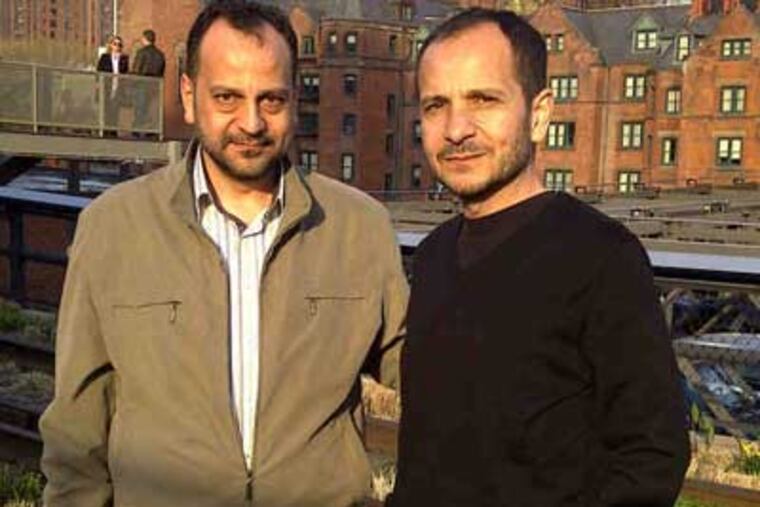Daniel Rubin: Doctor's return home to Syria after Philadelphia-area visit comes to violent end
Sakher Hallak told his brother he , despite the killings. Yes, the situation at home had worsened during his three weeks in America this spring. But in Aleppo, a historic city near the Turkish border, Sakher was a prominent physician, not a political man. He felt comfortable, protected.

Sakher Hallak told his brother he was not afraid to return to Syria, despite the killings.
Yes, the situation at home had worsened during his three weeks in America this spring. But in Aleppo, a historic city near the Turkish border, Sakher was a prominent physician, not a political man. He felt comfortable, protected.
From his home in Merion Park, Hazem Hallak kept in touch with his younger brother, but he knew better than to talk by phone.
Hazem and Sakher would use code to communicate on Facebook and Skype about the turmoil that, human-rights activists say, has led to 1,300 deaths and 10,000 arrests since March.
Sakher would say a lot of apples were falling.
Apples meant dead people.
In their last chat, Hazem asked if his brother, operator of the country's only eating-disorders clinic, was interested in becoming the Middle East sales representative for a new drug being developed. That was May 24.
"He said he wasn't interested in doing anything right now because of the situation."
Late the next night, Sakher, 43, disappeared while driving home from work.
Frantic, his family and friends made inquiries about the surgeon.
A friendly Syrian politician told them that Sakher had been grabbed by the Mukhabarat, the state intelligence agency. Sakher called a friend the next morning, presumably while in custody, saying the same thing. A day later, members of the Mukhabarat visited his wife and said Sakher was fine, and would be coming home soon.
That was May 29. On the 30th, the coroner called the doctor's family.
A man driving in a rural area about 20 kilometers south of Aleppo spotted a discarded mudguard by the side of the road. That was when he came upon the body of a well-dressed man, shoes still shined.
Family members identified the corpse, which had come to a violent end. The eyes had been gouged, the genitals mutilated, Hazem says. Most of the bones were broken.
Hazem says the intelligence agency contends it never detained his brother. Blame lay elsewhere: Israel or the opposition. Then the doctor's office manager was arrested.
Syrian officials say the case is criminal, not political.
"He has never been detained by Syrian authorities," Roua Sharbaji of the Syrian Embassy in Washington told me by e-mail. "According to Ahmad Balash, a judge and member of the legal commission which inspected the body of Dr. Sakher Hallak, 'The cause of death was cerebral hypoxia resulting from being hung. Further evidence was found on the body indicating that he received severe wounds on his head from being beaten.' "
The investigation continues.
Hazem says his brother must have frustrated his keepers. "I think he died during the interrogation. He was mild-mannered, sarcastic. I could hear him saying, 'Come on, guys. I'm like you.' They wanted more. He had nothing to give."
He says his brother's trip to America was his first, and for business and family. In Philadelphia, Hazem and his brother did "the touristy things - the Liberty Bell, the Constitution Center, the Comcast tower."
They dined at a Chinese restaurant in West Philadelphia that Hazem had discovered when he moved here in 1984 to begin postdoctoral studies in medical biochemistry at Penn. That's where he met his wife, a Penn oncologist.
His brother's favorite place may have been Trader Joe's in Ardmore. "He insisted we go there every day."
After Philadelphia, Sakher traveled to Fresno, Calif., to visit a sister who is dentist, and then to West Virginia to see another brother, an electrical engineer. Hazem and Sakher flew to Miami for a medical conference on eating disorders and spent three days there.
Sakher loved Miami, his brother says - sunny, spotless, happy, and no one had to pay to go the beach, unlike in Syria, where waterfront property is increasingly owned by private parties.
Hazem, seven years older than his brother, says he is haunted by his death. "I actually raised him and changed his diapers. He looked like me, acted like me. It was as if he was my clone, except younger. It's devastating. I see him hovering over me every day. I can't get over it."
Hazem says he had an idea things turned badly for his brother the day after he vanished. A new entry on his Facebook page appeared.
There were no words, just an unlikely image given the source: a bouquet of flowers.
A symbol of peace? he wondered. Or a funeral arrangement.
That day Hazem learned from family back home that his brother was gone.
"They took him," are the words a family member used. No one mentioned who they were. "No," Hazem says. "Who else is going to take him?"